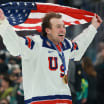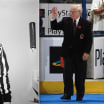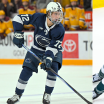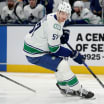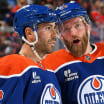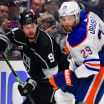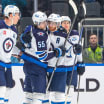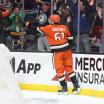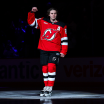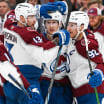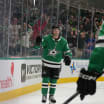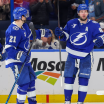Backes talks life in retirement in Q&A with NHL.com
Former forward discusses respect for Getzlaf, working in radio, opening restaurant with wife
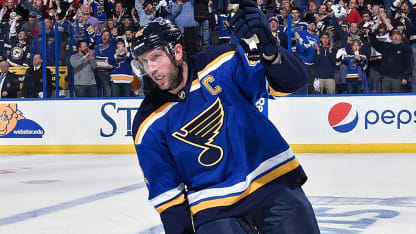
© Scott Rovak/Getty Images
David Backes was at TD Garden in Boston on Thursday and discovered that being a fan is much more difficult than being a player.
The 37-year-old realized this while watching his alma mater, Minnesota State, defeat the University of Minnesota 5-1 in the NCAA Frozen Four semifinals to reach the championship game for the first time. Minnesota State lost 5-1 to the University of Denver in the national title game Saturday.
"This is harder. Way harder," Backes said. "And I can imagine being a coach is 10 times even harder because you can't have an impact on the ice. And when you're sitting watching like I was, there's nothing you can do to influence the outcome of a game or to impact it."
Backes was able to make his own impact in the NHL for 15 seasons (2006-21), scoring 561 points (248 goals, 313 assists) in 965 games with the St. Louis Blues, Boston Bruins and Anaheim Ducks. The forward, who retired Sept. 8, now has plenty of time to cheer for Minnesota State. He scored 119 points (46 goals, 73 assists) in 115 games during three seasons for the Mavericks (2003-06).
Backes said Minnesota State has improved significantly since his college days and that it's put a much-deserved spotlight on the program. So did the announcement Friday that Minnesota State goalie Dryden McKay won the Hobey Baker Award as the top player in NCAA men's ice hockey this season.
"The success the Mavericks have enjoyed getting back to the Frozen Four after making their first trip ever there last year is amazing," Backes said. "Win or lose, it's pretty outstanding. To think when I was playing there 18 years ago that we were scratching and clawing just to not get embarrassed against some of the bigger schools, and now the program's at a place where it's been in the Frozen Four two consecutive years.
"It's certainly a source of pride for myself and my wife to both be alumni, and to be here."
Seven months after ending his playing career, Backes is keeping busy on various fronts, including regular weekly spots on SiriusXM NHL Network Radio and opening a restaurant with his wife, Kelly, in Edina, Minnesota. NHL.com caught up with him and discussed a number of topics, including retiring as a member of the Blues, life after the NHL, and why he feels former Ducks teammate Ryan Getzlaf deserves to go into the Hockey Hall of Fame.
How special was it to retire as a member of the Blues, after you were their captain and played the majority of your NHL career with them? You got your wish to do it when the Ducks traded you back there so you could sign a one-day contract.
"It was very special. My family and I spent 10 years there and those people were so good to us. It's a blue-collar place full of hardworking people appreciative of work ethic on the ice. They expect you to give them everything you've got. Their reaction when I played my last game there was incredible. I was on the Ducks, I was on the other team, and they still took time to give me such an amazing reception. It's something I'll never forget."
You're referring to the game May 5 when the Ducks defeated the Blues 3-2 in the shootout at Enterprise Center?
"Again, it was special. My wife and I were entrenched in the community. When you are in a place from age 22 to 32, those are formative years in your life which helps shape you into the person you eventually become. So when I played that last game in St. Louis, and the fans were so receptive, it just brought everything full circle to me. So the idea to sign a one-day contract back there where I'd spent 10 years was an awesome opportunity that the Blues afforded me."
Getzlaf played a big role in you dressing for that game. Can you elaborate?
"I wasn't playing much at the time, but he went to the coaches and said, 'He's playing.' [Getzlaf] knew how important it was for me, and he made sure I was going to play. That's the type of captain and leader he is. I'd obviously played against him before I was traded to the Ducks and it wasn't fun. I remember one game, it was at the end of overtime and he wanted to fight me. I'm not sure if you can take part in a shootout if you have a fighting major. I wondered: 'What's wrong with this guy?' Then I became his teammate and learned that's just how competitive he is. And how he went to bat for me to play that last game in St. Louis was much appreciated."
Getzlaf on Tuesday said he would retire at the end of the season. In your mind, is he a Hall of Famer?
"Without a doubt. If you want statistical backings or Stanley Cups or Olympic gold medals, check. What else do you want on a resume from a guy that did it the right way and did it the hard way?"
Describe what you mean by "the hard way."
"He was not a perimeter, cute player. He went to the hard areas. When he played with Corey Perry and Patrick Maroon in Anaheim, they would put a puck below your goal line and they would just hold it there as long as they wanted. It was like, 'Enough already!' And then they take it to the net and, likely, in the back of your net. Just their ability to dominate. And the way he played the game and his success playing the game, I think he's a no-doubt Hall of Famer."
He'll have to keep busy in retirement, something you've been able to do thus far. One of your projects is the Stalk & Spade restaurant, which will feature 100 percent plant-based food. How did you develop a taste for that?
"I developed a medical condition where red meat wasn't processing quickly enough so I started adopting plant-based meals in my diet. My wife and I went out for dinner at a place in Minnesota and it was the best plant-based food we'd ever had. When we learned they were franchising and the opportunity came up, I did some research and we were in. And just can't be more excited to make plant-based eating available to more people."
You also have regular gigs on satellite radio. Is media something you'd like to pursue? Would you like to work in an NHL front office one day?
"The radio thing, I had done a spot and the producer, Bruce Bolton, said, 'You're good at this. How would you like to do this regularly?' It's fun. It's a way to stay connected to the game, which is important. As for pursuing that or a job with a team, it has to be the right spot, the right fit. If you gave me a blank piece of paper to map out my future, I can't tell you what would be on it, geographically, professionally, anything. One step at a time. Right now I'm just enjoying being around the family."
Finally, did being back in TD Garden for the Frozen Four bring up bad memories of the 2019 Stanley Cup Final when you and the Bruins lost Game 7 to the Blues, your former team? How long did it take you to get over the sting even though many of your friends and ex-teammates on the Blues got to hoist the Cup?
"It was probably the better part of over a year that I was bitter. And full disclosure: I never watched the Cup being handed over. I never watched the guys hand it over to each other. I obviously know that's the tradition, but I just wasn't in a place where I wanted to watch them celebrate on TV on TD Garden ice. I was in our locker room in the Garden until 1:30 a.m. and you could hear the celebrations most of the night. Those are tough memories. In retrospect, after a year, you realize it was a heck of a series. I wish we'd come out on top, but what a great thing for the city of St. Louis. For them to have 50-plus years of history and finally have a Cup in that building, in that town, is amazing. It's something I wish more for them. I just wish it didn't come at my expense. But that's the way things go. That's how you get perspective."
